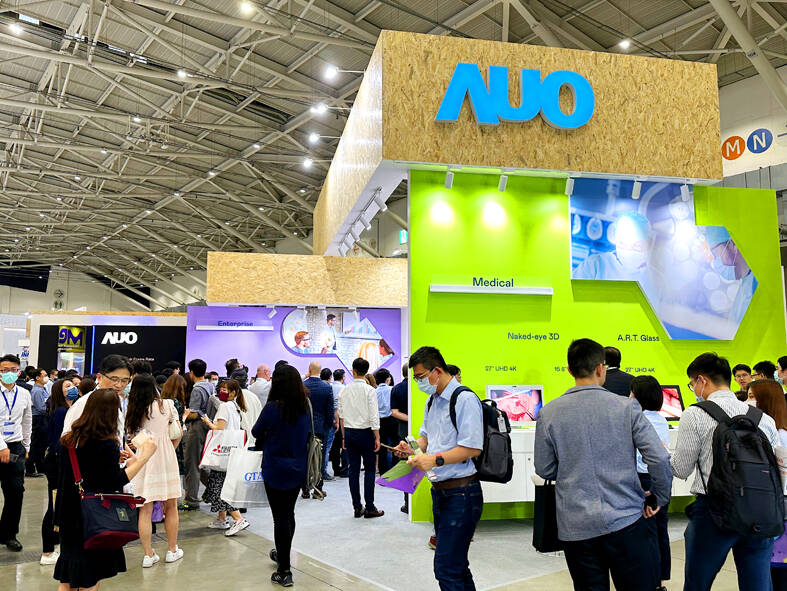LCD panel maker AUO Corp (友達光電) might file an appeal or take other measures to fight a recent court ruling in South Korea that ordered the company and its Taiwanese rival HannStar Display Corp (瀚宇彩晶) to pay compensation for alleged price-fixing.
In an announcement posted on the Taiwan Stock Exchange on Monday, AUO said that it would either appeal or take other “appropriate actions” against the ruling.
AUO would also make appropriate provisions for the possible compensation, which could hit 29.1 billion won (US$22.53 million) plus interest, the company said, adding that the ruling is unlikely to affect its operations.

Photo: Chen Mei-ying, Taipei Times
HannStar, which has been ordered to pay 3.79 billion won plus interest, said it had not yet received any court documents, but when it does, it would file an appeal.
With interest included, the compensation could rise to 53.5 billion won for AUO and 6.97 billion won for HannStar, according to news reports from South Korea.
Citing unnamed sources, South Korean news media on Monday said that AUO and HannStar were recently ordered by the Seoul Central District Court to pay damages to LG Electronics Inc for fixing the prices of TFT-LCD panels.
AUO and other flat-panel manufacturers and distributors in Taiwan, Japan and South Korea were accused by the US Department of Justice in the late 2000s of colluding to fix prices of TFT-LCD panels during secret bilateral and multilateral meetings dubbed the “crystal meetings” from 2001 to 2006.
AUO and its US unit, AU Optronics Corp America, were found guilty of the price-fixing conspiracy in March 2012.
Eight other companies pleaded guilty and have paid more than US$1.39 billion in criminal fines since 2008.
LG Electronics initially sued five Taiwanese companies in a civil case, following the criminal case brought by the US Department of Justice, but dropped the lawsuit against the three companies other than AUO and HannStar.
According to news reports from South Korea, the court dismissed the Taiwanese companies’ arguments that the lawsuit should be heard in their country of origin, ruling that the case and the parties involved have a practical connection with South Korea.

The New Taiwan dollar is on the verge of overtaking the yuan as Asia’s best carry-trade target given its lower risk of interest-rate and currency volatility. A strategy of borrowing the New Taiwan dollar to invest in higher-yielding alternatives has generated the second-highest return over the past month among Asian currencies behind the yuan, based on the Sharpe ratio that measures risk-adjusted relative returns. The New Taiwan dollar may soon replace its Chinese peer as the region’s favored carry trade tool, analysts say, citing Beijing’s efforts to support the yuan that can create wild swings in borrowing costs. In contrast,

Nvidia Corp’s demand for advanced packaging from Taiwan Semiconductor Manufacturing Co (TSMC, 台積電) remains strong though the kind of technology it needs is changing, Nvidia CEO Jensen Huang (黃仁勳) said yesterday, after he was asked whether the company was cutting orders. Nvidia’s most advanced artificial intelligence (AI) chip, Blackwell, consists of multiple chips glued together using a complex chip-on-wafer-on-substrate (CoWoS) advanced packaging technology offered by TSMC, Nvidia’s main contract chipmaker. “As we move into Blackwell, we will use largely CoWoS-L. Of course, we’re still manufacturing Hopper, and Hopper will use CowoS-S. We will also transition the CoWoS-S capacity to CoWos-L,” Huang said

Nvidia Corp CEO Jensen Huang (黃仁勳) is expected to miss the inauguration of US president-elect Donald Trump on Monday, bucking a trend among high-profile US technology leaders. Huang is visiting East Asia this week, as he typically does around the time of the Lunar New Year, a person familiar with the situation said. He has never previously attended a US presidential inauguration, said the person, who asked not to be identified, because the plans have not been announced. That makes Nvidia an exception among the most valuable technology companies, most of which are sending cofounders or CEOs to the event. That includes

INDUSTRY LEADER: TSMC aims to continue outperforming the industry’s growth and makes 2025 another strong growth year, chairman and CEO C.C. Wei says Taiwan Semiconductor Manufacturing Co (TSMC, 台積電), a major chip supplier to Nvidia Corp and Apple Inc, yesterday said it aims to grow revenue by about 25 percent this year, driven by robust demand for artificial intelligence (AI) chips. That means TSMC would continue to outpace the foundry industry’s 10 percent annual growth this year based on the chipmaker’s estimate. The chipmaker expects revenue from AI-related chips to double this year, extending a three-fold increase last year. The growth would quicken over the next five years at a compound annual growth rate of 45 percent, fueled by strong demand for the high-performance computing